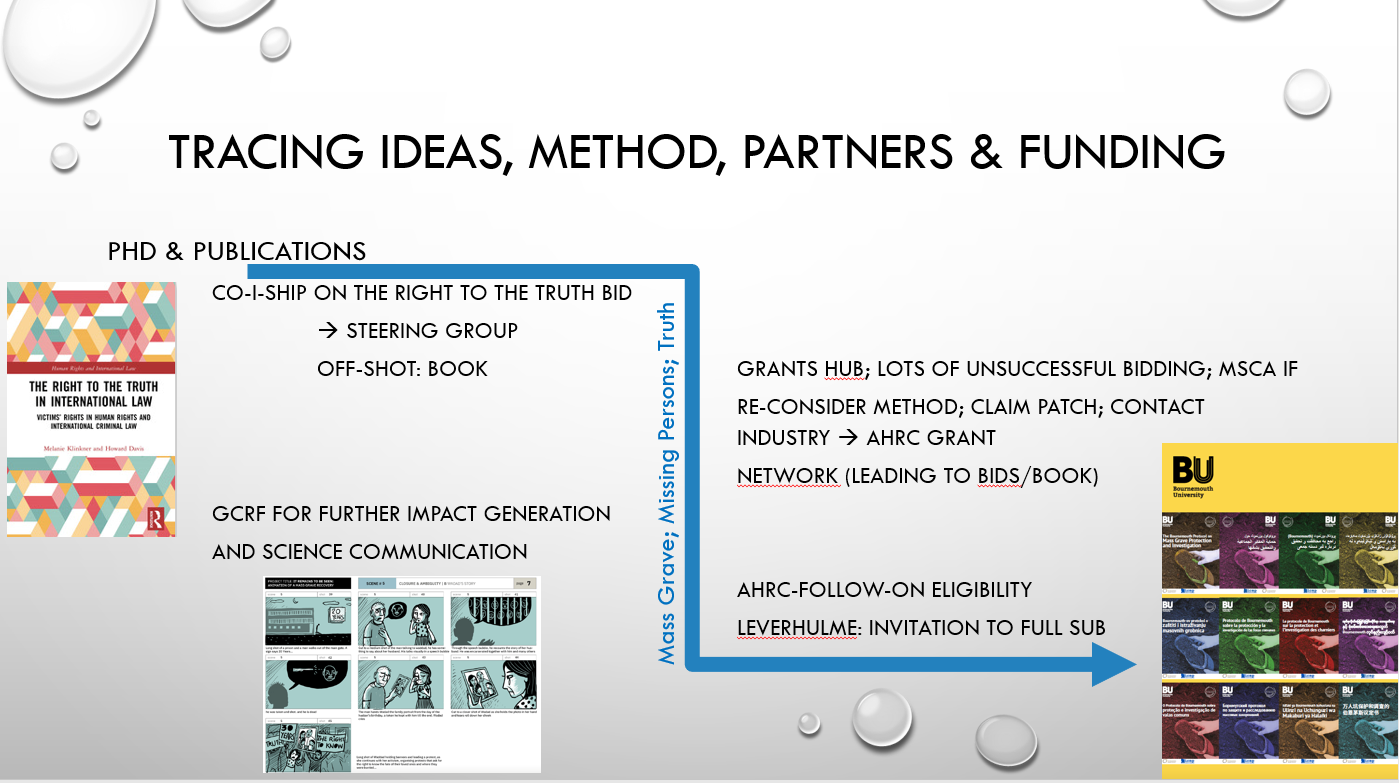Professor Melanie Klinkner.

There is so much advice, guidance for beginners and information available that it is hard to write anything original on the subject. Ironically, that’s exactly what grant writing is about: crafting an original, timely, (socially) relevant, scientifically robust, considered and impactful project often in conjunction with great partners. And that pretty much sums it up. But it may take a bit of time for it all to come together…So where might the journey start?
Mine your expertise. For me this still means on occasions returning to the roots of my PhD. I developed my first full-blown funding application during my PhD. I spotted what I thought was an exciting gap, I found a funder interested in post-conflict research, I teamed up with my supervisor and together generated support from the then President of the International Criminal Court for the Former Yugoslavia. And off we went to develop a proposal. We made it through the first round and then, a change of guard at the Court meant we could no longer rely on their support. We withdrew the application. Bad luck, but lots learnt. Particularly not to get deterred by a snooty Professor asking ‘why ever would you like to develop that for?’ or a research administrator ‘but that has been done before, right?’ In fact, the same core idea, arguably, far better conceived with a different approach, validated by experts, a multidisciplinary team and virtual technological know-how is presently under consideration as a science communication project. This is 12 years after the original submission; an ‘up-cycling’ of sorts.
Checks & Balances. My second funding application submitted in collaboration with my colleague and mentor Dr Howard Davis was thankfully successful. And it resulted in a co-authored book. A funder recommendation was the creation of a steering group for the project, something that I have since adopted for other applications resulting in lovely, continuous engagement with colleagues beyond the institution for the purpose of project delivery. A steering committee or advisory group is well worth having and they will make the most wonderful advocates for your research expertise.
Look through Examples. Assuming that I am in the initial planning phase where I know
- what the research aim is;
- which funder to go for;
- and who I would like to collaborate with;
then, apart from notifying RDS and your departmental lead with the Intention to bid and thinking about a suitable internal peer reviewer, I visit the Brightspace library of prior successful funding applications. And I look through those. Every funder has different structural requirements and it is helpful to see how others have approached it.
Pro-act, not re-act. Subscribing to Research Professional means that every Friday an email with the latest funding calls matching my keyword search arrives. And that helps you get a rough idea of the funding landscape and what are recurring themes and calls. And I put notes in my calendar if I think that a call might be of interest to me in a year or so. Responding de novo to a sudden, non-recurring funding call seems like a tall order to me unless you have some prior ideas, established links and method expertise that you can build on.
Finally, try to convince the reviewer at every opportunity that you, your idea, project plan, team and network are best and uniquely placed to conduct this study now! I’d like to hope that the journey has an element of linear progression and that one gets better at answering every aspect of the question ‘why should they fund me?’
 Research fundamentals: Its a process – not a destination
Research fundamentals: Its a process – not a destination Making the Most of Writing Week Part 3: Research grant applications – choosing a funder
Making the Most of Writing Week Part 3: Research grant applications – choosing a funder Do you need help with your research application?
Do you need help with your research application?










 REF Code of Practice consultation is open!
REF Code of Practice consultation is open! BU Leads AI-Driven Work Package in EU Horizon SUSHEAS Project
BU Leads AI-Driven Work Package in EU Horizon SUSHEAS Project Evidence Synthesis Centre open at Kathmandu University
Evidence Synthesis Centre open at Kathmandu University Expand Your Impact: Collaboration and Networking Workshops for Researchers
Expand Your Impact: Collaboration and Networking Workshops for Researchers ECR Funding Open Call: Research Culture & Community Grant – Apply now
ECR Funding Open Call: Research Culture & Community Grant – Apply now ECR Funding Open Call: Research Culture & Community Grant – Application Deadline Friday 12 December
ECR Funding Open Call: Research Culture & Community Grant – Application Deadline Friday 12 December MSCA Postdoctoral Fellowships 2025 Call
MSCA Postdoctoral Fellowships 2025 Call ERC Advanced Grant 2025 Webinar
ERC Advanced Grant 2025 Webinar Update on UKRO services
Update on UKRO services European research project exploring use of ‘virtual twins’ to better manage metabolic associated fatty liver disease
European research project exploring use of ‘virtual twins’ to better manage metabolic associated fatty liver disease